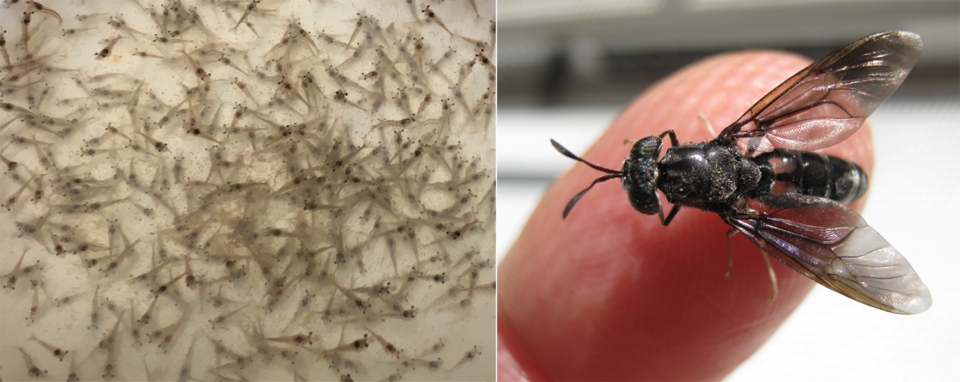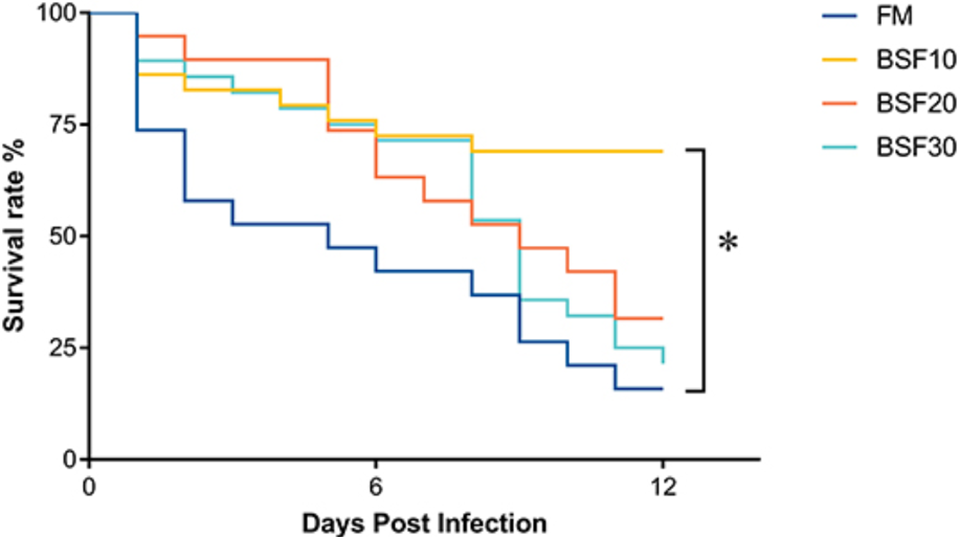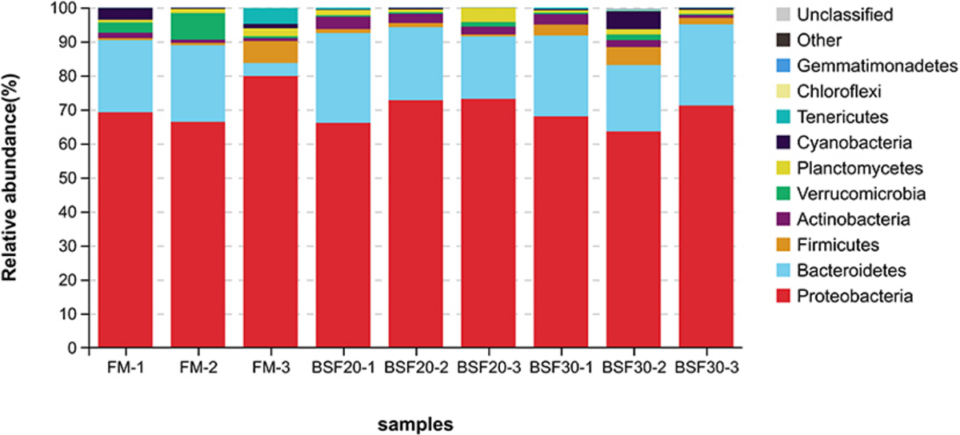Up to 20 percent fishmeal replacement can improve shrimp intestinal microbiota, AHPND resistance without negative effects

The Pacific white shrimp (Litopenaeus vannamei) is a prominent aquaculture species globally. Over the years, its culture has been impacted by several diseases that have caused significant mortality and loses. Some of these diseases – such as the White Feces Syndrome (WFS), Early Mortality Syndrome (EMS) or Acute Hepatopancreatic Necrosis Disease (AHPND) – seriously affect the gastrointestinal organs of infected shrimp, and much research has been conducted to improve the gut health of L. vannamei, including through the use of novel feed ingredients.
Several studies have evaluated the experimental feeding of L. vannamei with insect meal-based diets, including from mealworms (Tenebrio molitor), silkworm pupae (Bombyx mori) and black soldier flies (BSF, Hermetia illucens). The BSF is a saprophytic [animal that feeds by absorbing dissolved organic materials from the products of organic breakdown and decay] insect commonly used for the sustainable recycling of animal waste and other organic wastes. Its larvae are rich in proteins and lipids, and it is also considered a promising alternative protein source for aquatic animals.
Black soldier fly larval production in a stacked production system
A number of studies have evaluated the effectiveness of BSF as a fishmeal replacement in diets of L. vannamei. Some researchers reported that growth responses were observed if the amount of fishmeal replaced with black soldier fly larvae meal was no more than 25 percent. Another study showed that BSF substitution of less than 30 percent of fishmeal in diets did not negatively affect the growth performance of L. vannamei. In addition, dietary BSF larvae meal has been shown to differently affect the intestinal health of different fish species, with results showing from no observed effects to significant pathological changes in the intestinal walls. It is still unclear how dietary BSF affects the intestinal health of L. vannamei.
This article – adapted and summarized from the original publication [Xie, S. et el. 2021. Evaluation of the Dietary Black Soldier Fly Larvae Meal (Hermetia illucens) on Growth Performance, Intestinal Health, and Disease Resistance to Vibrio parahaemolyticus of the Pacific White Shrimp (Litopenaeus vannamei). Front. Mar. Sci., 10 August 2021 – reports on the results of a study on the effect of dietary BSF meal on the growth performance, intestinal structure, and immunity as well as the intestinal microbiota communities of L. vannamei.
Study setup
The experiment was conducted at Guangdong Ocean University, Zhanjiang, China with juvenile L. vannamei sourced from a local hatchery. The shrimp were fed a commercial feed (crude protein 48 percent, crude fat 8 percent) and acclimated to the experimental conditions for a week. Healthy and uniform-sized juvenile shrimp (~0.88 grams) were distributed among four groups in triplicate into 300-liter fiberglass tanks at 40 animals per tank. Shrimp were fed to apparent satiation four times daily for seven weeks. In the first four weeks, shrimp were fed 1.0-mm pellets, and then 1.5-mm pellets during the last three weeks. During the experiment, 60 percent of the water was exchanged each day with disinfected seawater, and adequate water temperature and salinity were maintained and regularly monitored.
A local, commercial BSF meal was used in this experiment; it contained 35.17 percent crude protein and 32.6 percent crude lipid. The basal diet was formulated to contain 25 percent fishmeal and then the fishmeal was replaced with BSF meal at 10, 20 and 30 percent of the fishmeal protein; these diets are referred to as FM, BSF10, BSF20, and BSF30, respectively. With the increase of BSF addition, the level of fish oil, soybean oil, and soybean lecithin was gradually reduced to balance the crude lipid levels among the four diets. Several essential amino acids were supplemented to the BSF diets to obtain similar amino acid profiles as the FM diet.
For detailed information on the experimental design and animal husbandry; sample collections and analyses; the Vibrio parahaemolyticus challenge trial; various histological and molecular biology assessments; and statistical analyses, refer to the original publication.
Results and discussion
Our results showed that better shrimp growth resulted from a 20 percent fishmeal replacement with BSF meal, and that replacing 30 percent of fishmeal significantly reduced the final body weight, weight gain, and the specific growth rate of the shrimp. Due to its high lipid content (10 to 40 percent), BSF meal is often processed by oil separation methods into protein-rich components to minimize the risk of fat oxidation and compositional changes.
The use of defatted BSF in shrimp feed has also been studied. Defatted BSF can replace up to 60 percent of fishmeal without negatively affecting the growth performance, and the antioxidant and immune capacity of shrimp. This suggests that the inhibition of growth performance by the addition of high levels of BSF meal to shrimp diets may be due to the fatty acid composition in BSF. Under our experimental conditions, the fatty acid composition of BSF was rich in lauric acids, but very low in EPA and DHA, compared to FM. Lipids are not only a major source of energy and carriers of fat-soluble vitamins, but also serve as components of cell membranes and precursors for many important metabolites.
Other insect proteins have also been studied in shrimp diets, including silkworms (Bombyx mori). Researchers have reported that replacing 75 percent of fishmeal with defatted silkworm meal did not affect the growth performance of L. vannamei, but higher levels of silkworm meal would lead to hepatopancreas damage. However, the effect of dietary BSF meal on intestinal health remains unknown, and excessive replacement of fishmeal may lead to impaired nutritional sensitivity and metabolism. Intestinal histology is directly related to the digestion and absorption of nutrients by the shrimp, thus affecting growth.
The non-specific immune system of the shrimp plays an important role in the resistance to pathogen invasion. To evaluate the effect of dietary BSF meal on resistance to AHPND-causing Vibrio parahaemolyticus infection, we conducted a challenge trial to compare the disease resistance of shrimp fed diets containing different levels of BSF meal. Our results showed that the survival rate of shrimp fed with BSF10 was significantly higher than those fed with fishmeal after infection, indicating that BSF replacement of 10 percent fishmeal could improve the resistance of L. vannamei to V. parahaemolyticus.

We also investigated the effect of BSF on immune gene expression in the intestine, and our data were consistent with the results of the challenge trial, indicating that dietary BSF meal replacing 10 percent FM can improve intestinal immunity in shrimp.

In addition to the immune defense of shrimp, the gut microbiota has been found to have a remarkable effect on animal health, growth and survival, and is of increasing interest to researchers and producers. We examined the intestinal microbiota of shrimp fed with FM, BSF20, and BSF30 diets, and the results showed that there were no significant differences in the diversity of intestinal microbiota community in shrimp fed with the FM, BSF20, and BSF30 diets. At the phylum level, Proteobacteria was the most common bacteria in the shrimp gut, followed by Bacteroidetes, Firmicutes and Actinobacteria, which was in line with the results reported by other researchers. Based on our results, the increase of beneficial bacteria and the reduction of harmful bacteria suggest that the BSF20 diet may improve the intestinal bacterial communities of L. vannamei.
Perspectives
Our study evaluated the effects of dietary BSF meal on growth, intestinal health, and susceptibility to V. parahaemolyticus of L. vannamei. Results showed that BSF meal replacement of 10 percent fishmeal did not negatively affect the growth performance and intestinal histology of the shrimp and improved the survival rate after infection with the bacterium. A 20 percent replacement of fishmeal showed no negative effects on the shrimp intestinal integrity and promoted a positive modulation in the intestinal microbiota. However, a higher fishmeal replacement, up to 30 percent, promoted the degeneration and programmed death (apoptosis) of intestinal cells and was detrimental to the shrimp.
Now that you've reached the end of the article ...
… please consider supporting GSA’s mission to advance responsible seafood practices through education, advocacy and third-party assurances. The Advocate aims to document the evolution of responsible seafood practices and share the expansive knowledge of our vast network of contributors.
By becoming a Global Seafood Alliance member, you’re ensuring that all of the pre-competitive work we do through member benefits, resources and events can continue. Individual membership costs just $50 a year.
Not a GSA member? Join us.
Author
-
Shiwei Xie, Ph.D.
Corresponding author
Laboratory of Aquatic Nutrition and Feed, College of Fisheries, Guangdong Ocean University, Zhanjiang, China; and
Aquatic Animals Precision Nutrition and High-Efficiency Feed Engineering Research Centre of Guangdong, Zhanjiang, China; and
Key Laboratory of Aquatic, Livestock and Poultry Feed Science and Technology in South China, Ministry of Agriculture, Zhanjiang, China



